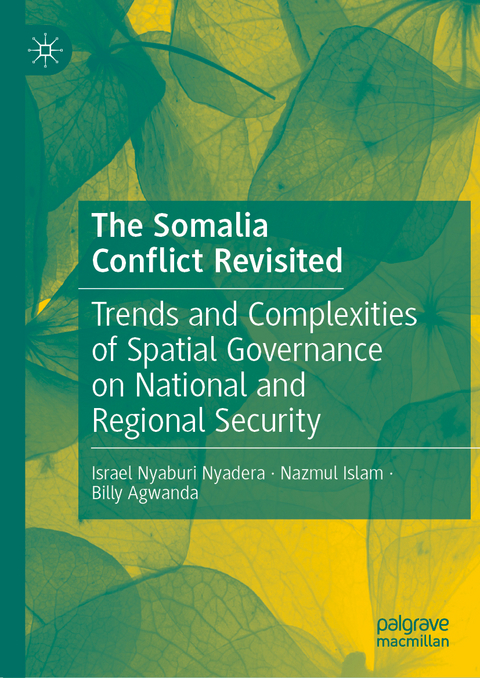
The Somalia Conflict Revisited
Springer International Publishing (Verlag)
978-3-031-55731-6 (ISBN)
This book aims to examine how informality of spatial governance has influenced the evolution of the conflict in Somalia and the region. It not only reopens the debate over how the irregular conflicts can transcend national boundaries, but also presents the complexities of spatial governance on national and regional security. The book examines how socio-political and identity bonds play out in spatial governance sometimes resulting to informal control of vast national territories. The book argues that such informally governed spaces increase the level of security threat vulnerability at the national and regional levels. The book therefore adds to the existing literature which has not only to be dominated by discourses on the impact of identity on the conflict but also fall short of connecting the impact of informal spatial governance on security. Examining how informality in governance in one country can impact on the security of an entire region is a key consideration in emerging peacebuilding strategies.
Israel Nyaburi Nyadera, Ph.D., teaches international relations at Egerton University. He currently holds the Swiss Government Excellence Postdoctoral fellowship at the Geneva Graduate Institute, Switzerland, and is a non-resident fellow at the Irregular Warfare Initiative (a joint project of Princeton University and Westpoint). He has been a visiting fellow under the India-Africa Security fellowship program at MP-IDSA, New Delhi, India, an Inter-Russia visiting fellow at the MGIMO University, a Global Africa young researchers' fellow at LASDEL and a Charles E. Scheidt Fellow for Genocide and Mass Atrocity Prevention, at the George Manson University.
Md. Nazmul Islam, Ph.D., is a distinguished academic, a researcher and currently serving as an assistant professor of Political Science and Public Administration and the head of Türkiye, Asia, and Indo-Pacific Studies, ULISA, at Ankara Yildirim Beyazit University (AYBU), Turkiye. He teaches postgraduate courses in the Department of Media and Communication Studies at Ankara University and the Department of Peace and Conflict Studies at Social Sciences University of Ankara (ASBU). Besides, Prof. Islam worked as a special advisor at the Foreign Relations and Protocol Department, Grand National Assembly of Türkiye-Turkish Parliament (TBMM).
Billy Agwanda is a Ph.D. presidential scholar at the Jimmy and Rosalynn Carter School of Conflict Analysis and Resolution. He has published in several international journals such as Politics and Governance, African Journal on Terrorism; the Commonwealth Journal of International Affairs; and African Journal on Conflict Resolution and contributed book chapters in the Palgrave Encyclopedia of Peace and Conflict Studies and the Routledge Handbook of Conflict Response and Leadership in Africa. His interests include peace and conflict resolution, critical terrorism studies, international security and foreign policy analysis. He has mainly worked as an adjunct lecturer, as a teaching assistant and as a junior project coordinator for international training projects.
Chapter 1: Introduction.- Chapter 2: The Origins of Conflict In Somalia: A Historical Context.- Chapter 3: Clan Configuration and Identity Networks in Somalia.- Chapter 4: Spatial (Un)Governance and Its Application in Somalia.- Chapter 5: Complexity of Somalia Conflict: Features and Actors.- Chapter 6: Socio-Economic and Political Consequences of the Somali Conflict.- Chapter 7: Impact of the Somali Conflict on National and Regional Security.- Chapter 8: Conclusion.
| Erscheinungsdatum | 02.04.2024 |
|---|---|
| Zusatzinfo | XXIII, 192 p. 21 illus., 19 illus. in color. |
| Verlagsort | Cham |
| Sprache | englisch |
| Maße | 148 x 210 mm |
| Themenwelt | Sozialwissenschaften ► Politik / Verwaltung ► Politische Systeme |
| Sozialwissenschaften ► Politik / Verwaltung ► Vergleichende Politikwissenschaften | |
| Schlagworte | Africa • Conflict Resolution • Regional Security • Somalia • Spatial Governance |
| ISBN-10 | 3-031-55731-X / 303155731X |
| ISBN-13 | 978-3-031-55731-6 / 9783031557316 |
| Zustand | Neuware |
| Informationen gemäß Produktsicherheitsverordnung (GPSR) | |
| Haben Sie eine Frage zum Produkt? |
aus dem Bereich


